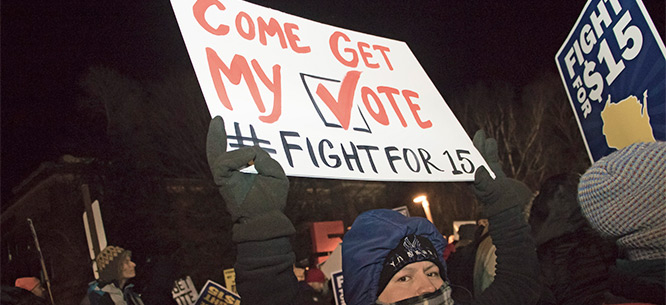In Dissent magazine, Nancy Fraser outlines the opportunities presented by the end of what she call “progressive neoliberalism.” She describes the latter as an alliance between financialized capitalism and superficial discourses on diversity and cultural liberalism, represented by figures like Bill Clinton. This is the ideology that was roundly rejected by Trump voters, writes Fraser. But the decline of this ideology presents an opportunity to build what Fraser calls a “new new left.” Here’s an excerpt from the piece:
Nevertheless, Trump’s victory is not solely a revolt against global finance. What his voters rejected was not neoliberalism tout court, but progressive neoliberalism. This may sound to some like an oxymoron, but it is a real, if perverse, political alignment that holds the key to understanding the U.S. election results and perhaps some developments elsewhere too. In its U.S. form, progressive neoliberalism is an alliance of mainstream currents of new social movements (feminism, anti-racism, multiculturalism, and LGBTQ rights), on the one side, and high-end “symbolic” and service-based business sectors (Wall Street, Silicon Valley, and Hollywood), on the other. In this alliance, progressive forces are effectively joined with the forces of cognitive capitalism, especially financialization. However unwittingly, the former lend their charisma to the latter. Ideals like diversity and empowerment, which could in principle serve different ends, now gloss policies that have devastated manufacturing and what were once middle-class lives.
Progressive neoliberalism developed in the United States over the last three decades and was ratified with Bill Clinton’s election in 1992. Clinton was the principal engineer and standard-bearer of the “New Democrats,” the U.S. equivalent of Tony Blair’s “New Labor.” In place of the New Deal coalition of unionized manufacturing workers, African Americans, and the urban middle classes, he forged a new alliance of entrepreneurs, suburbanites, new social movements, and youth, all proclaiming their modern, progressive bona fides by embracing diversity, multiculturalism, and women’s rights. Even as it endorsed such progressive notions, the Clinton administration courted Wall Street. Turning the economy over to Goldman Sachs, it deregulated the banking system and negotiated the free-trade agreements that accelerated deindustrialization. What fell by the wayside was the Rust Belt—once the stronghold of New Deal social democracy, and now the region that delivered the electoral college to Donald Trump. That region, along with newer industrial centers in the South, took a major hit as runaway financialization unfolded over the course of the last two decades. Continued by his successors, including Barack Obama, Clinton’s policies degraded the living conditions of all working people, but especially those employed in industrial production. In short, Clintonism bears a heavy share of responsibility for the weakening of unions, the decline of real wages, the increasing precarity of work, and the rise of the two–earner family in place of the defunct family wage.
As that last point suggests, the assault on social security was glossed by a veneer of emancipatory charisma, borrowed from the new social movements. Throughout the years when manufacturing cratered, the country buzzed with talk of “diversity,” “empowerment,” and “non-discrimination.” Identifying “progress” with meritocracy instead of equality, these terms equated “emancipation” with the rise of a small elite of “talented” women, minorities, and gays in the winner-takes-all corporate hierarchy instead of with the latter’s abolition. These liberal-individualist understandings of “progress” gradually replaced the more expansive, anti-hierarchical, egalitarian, class-sensitive, anti-capitalist understandings of emancipation that had flourished in the 1960s and 1970s. As the New Left waned, its structural critique of capitalist society faded, and the country’s characteristic liberal-individualist mindset reasserted itself, imperceptibly shrinking the aspirations of “progressives” and self-proclaimed leftists. What sealed the deal, however, was the coincidence of this evolution with the rise of neoliberalism. A party bent on liberalizing the capitalist economy found its perfect mate in a meritocratic corporate feminism focused on “leaning in” and “cracking the glass ceiling.”
The result was a “progressive neoliberalism” that mixed together truncated ideals of emancipation and lethal forms of financialization. It was that mix that was rejected in toto by Trump’s voters. Prominent among those left behind in this brave new cosmopolitan world were industrial workers, to be sure, but also managers, small businessmen, and all who relied on industry in the Rust Belt and the South, as well as rural populations devastated by unemployment and drugs. For these populations, the injury of deindustrialization was compounded by the insult of progressive moralism, which routinely cast them as culturally backward. Rejecting globalization, Trump voters also repudiated the liberal cosmopolitanism identified with it. For some (though by no means all), it was a short step to blaming their worsening conditions on political correctness, people of color, immigrants, and Muslims. In their eyes, feminists and Wall Street were birds of a feather, perfectly united in the person of Hillary Clinton.
Image: At a Fight for $15 rally in Chicago, February 11, 2016. Via Dissent.
